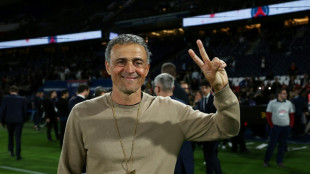
| RBGPF | 3.9% | 65.56 | $ | |
| CMSC | -0.18% | 22.09 | $ | |
| CMSD | -0.36% | 22.05 | $ | |
| BTI | -0.38% | 45.09 | $ | |
| SCS | -2.04% | 10.29 | $ | |
| RIO | -1.42% | 59.95 | $ | |
| BCC | -3.24% | 86.73 | $ | |
| NGG | -2.79% | 72.67 | $ | |
| GSK | -0.66% | 39.18 | $ | |
| BCE | -1.51% | 21.16 | $ | |
| RYCEF | 0.69% | 11.65 | $ | |
| RELX | -1.11% | 55.05 | $ | |
| VOD | -1.06% | 10.39 | $ | |
| JRI | -0.63% | 12.74 | $ | |
| BP | -0.73% | 28.94 | $ | |
| AZN | -0.82% | 70.38 | $ |

Ex-Wales flanker Popham wants his day in court with rugby authorities
Alix Popham, one of hundreds of former rugby players to bring a lawsuit against the sport's authorities for head injuries, told AFP he wants his day in court so he can look in the face some of the officials "who are part of the reason why we are in the mess we are in."
The former Wales flanker, who won 33 caps between 2003 and 2008 and played in two World Cups, was diagnosed in 2020 with probable chronic traumatic encephalopathy (CTE) at the age of 40.
CTE is a progressive brain condition that is thought to be caused by repeated blows to the head and episodes of concussion.
The basis of the legal case is that rugby's governing bodies failed to provide sufficient protection from the risks caused by concussion.
"The press are talking about 500 players, but I can tell you by the end of May, which is the deadline to join the suit, it will be double that," Popham told AFP in a phone interview.
"Everyone is in a different situation. However, I want to go to court and eyeball some of the people still involved in the game, who are part of the reason why we are in the mess we are in.
"Over the past six years what I have read and the evidence we have got needs to be public and go on the record.
"It is very powerful."
The sport's governing body World Rugby said the ongoing legal action prevented them from engaging with players "concerned in this story."
However, in a statement to AFP, they said: "We would want them to know that we listen, we care and we never stand still on player welfare."
- 'Measures in place' -
Popham, who realised something was seriously wrong when in 2019 he got lost on a bike ride close to his home and had to use an app to find his way back, is not just investing his time in the lawsuit.
He has also been going to schools and spreading the word about the risks involved.
He hopes the Brainsafe programme -- which is the "baby" of Popham, his wife Mel and two others and endorsed by the charity Head for Change -- will be rolled out nationally in September.
"We have seen 350 children, coaches and parents since January and are tweaking it now," he said.
"It is not all about doom and gloom, it is sports-specific as any child can have brain traumatic injury.
"We inform them of the signs and symptoms."
Popham, who is in training for an ironman event later this year, said the lack of knowledge about the risks had astonished him.
"Around 90 percent of parents, player and coaches still do not understand that every contact is causing damage," said the 45-year-old.
"Key rugby schools do but others less so, and some of the parents unfortunately are not interested."
Participation in rugby in schools in England is on the decline.
In the 2022-23 school year, 8.3 percent of children aged five to 16 played rugby, down from 9.7 percent four years earlier.
The decline was highlighted in last October's Review of Rugby in Schools which said the RFU, which commissioned the report, faced "an urgent issue approaching crisis point."
As a result the RFU invested £5 million ($6.8 million) into TI, a version of touch rugby that replicates scrums, lineouts and other technical aspects of the 15-a-side game.
On the other hand there are those who argue that in the contact format it is better that youngsters learn how to tackle aged nine rather than 14 when they are physically bigger.
Popham strongly disagrees. He said it was "easy to say about nine-year-olds the younger they learn the technique the better it is," but equated it to encouraging young children to smoke.
"It is better to put measures in place to protect them," he said.
In terms of warning about the risks, he believes public health advertisements are the way forward.
"Like those used in the past to advocate how bad smoking is for your health or how you can save your life by using seat belts," he said.
"That is what needs to happen -- to disabuse people of the attitude of 'oh it won't happen to me'."
A.Parmentier--JdB



